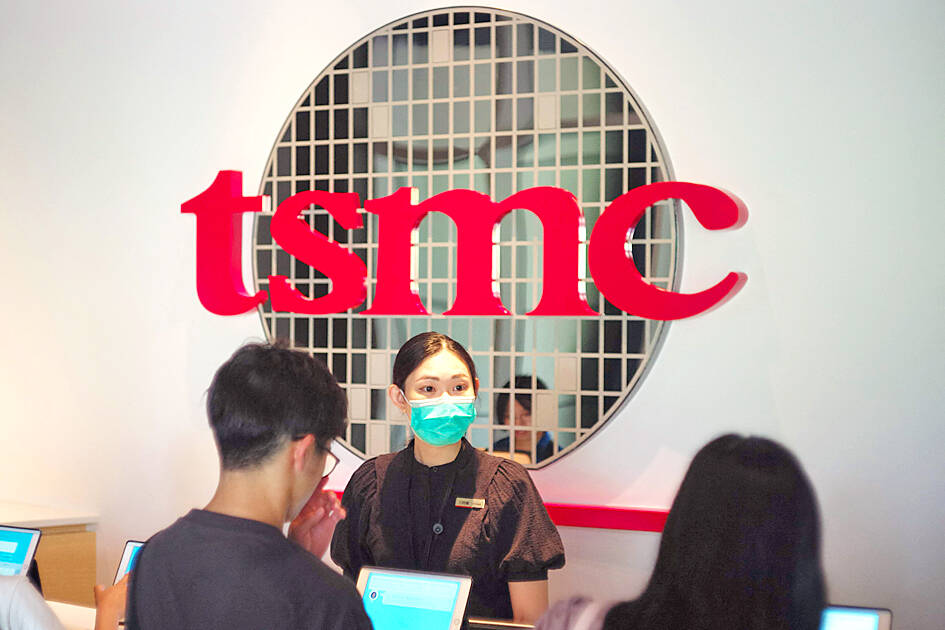Taiwan Semiconductor Manufacturing Co (TSMC, 台積電) said yesterday there was no damage to its facilities after an incident at its Arizona factory construction site where a waste disposal truck driver was transported to hospital.
Firefighters responded to an explosion on Wednesday afternoon at the TSMC plant in Phoenix, the Arizona Republic reported, citing the local fire department.
Cesar Anguiano-Guitron, 41, was transporting waste material from the project site and stopped to inspect the tank when he was made aware of a potential problem, a police report seen by Bloomberg News showed.

Photo by: Sam Yeh, AFP
Following an “uncontrolled pressure release,” he was hit by a blunt object and thrown 6m from the vehicle, the report said. The driver was then transported to the hospital by the local fire department, and the police department is investigating the incident.
The driver had died, Arizona Building and Construction Trades Council, a coalition of unions with about 3,000 members working on the TSMC project, said late Wednesday in a statement.
“The safety and well-being of construction workers are our top priorities, and we expect all regulatory agencies to conduct a thorough investigation into the incident,” the union said. “The goal should be to determine whether adequate safety measures were in place, the cause of the accident, and to implement any necessary measures to prevent such tragedies from occurring in the future.”
None of TSMC’s employees or onsite construction workers had reported any related injuries, TSMC, the world’s largest contract chipmaker, said in a statement.
“This is an active investigation with no additional details that can be shared at this time,” it added.
TSMC shares pared earlier gains after the news, and ended up 0.24 percent yesterday in Taipei trading.
The chipmaker’s first Arizona fab began wafer production last month and is on track to begin production using the 4-nanometer technology in the first half of next year.
It is to deploy the world’s most advanced 2-nanometer technology at its second Arizona fab, which is expected to begin production in 2028.
TSMC last month said it is to expand its planned investment in Arizona by US$25 billion to US$65 billion and to add a third Arizona fab by 2030, as part of efforts to diversify from its home base.
The project, which is set to win US$11.6 billion in federal grants and loans from the 2022 CHIPS and Science Act, has a fraught history with organized labor in Phoenix, including a months-long dispute over safety and management issues on the site.
The company and unions reached a labor accord in December last year, establishing a new committee focused on workforce training programs and transparency around safety issues as they arise.

RUN IT BACK: A succesful first project working with hyperscalers to design chips encouraged MediaTek to start a second project, aiming to hit stride in 2028 MediaTek Inc (聯發科), the world’s biggest smartphone chip supplier, yesterday said it is engaging a second hyperscaler to help design artificial intelligence (AI) accelerators used in data centers following a similar project expected to generate revenue streams soon. The first AI accelerator project is to bring in US$1 billion revenue next year and several billion US dollars more in 2027, MediaTek chief executive officer Rick Tsai (蔡力行) told a virtual investor conference yesterday. The second AI accelerator project is expected to contribute to revenue beginning in 2028, Tsai said. MediaTek yesterday raised its revenue forecast for the global AI accelerator used

Taiwan Semiconductor Manufacturing Co (TSMC, 台積電) has secured three construction permits for its plan to build a state-of-the-art A14 wafer fab in Taichung, and is likely to start construction soon, the Central Taiwan Science Park Bureau said yesterday. Speaking with CNA, Wang Chun-chieh (王俊傑), deputy director general of the science park bureau, said the world’s largest contract chipmaker has received three construction permits — one to build a fab to roll out sophisticated chips, another to build a central utility plant to provide water and electricity for the facility and the other to build three office buildings. With the three permits, TSMC

TEMPORARY TRUCE: China has made concessions to ease rare earth trade controls, among others, while Washington holds fire on a 100% tariff on all Chinese goods China is effectively suspending implementation of additional export controls on rare earth metals and terminating investigations targeting US companies in the semiconductor supply chain, the White House announced. The White House on Saturday issued a fact sheet outlining some details of the trade pact agreed to earlier in the week by US President Donald Trump and Chinese President Xi Jinping (習近平) that aimed to ease tensions between the world’s two largest economies. Under the deal, China is to issue general licenses valid for exports of rare earths, gallium, germanium, antimony and graphite “for the benefit of US end users and their suppliers

Dutch chipmaker Nexperia BV’s China unit yesterday said that it had established sufficient inventories of finished goods and works-in-progress, and that its supply chain remained secure and stable after its parent halted wafer supplies. The Dutch company suspended supplies of wafers to its Chinese assembly plant a week ago, calling it “a direct consequence of the local management’s recent failure to comply with the agreed contractual payment terms,” Reuters reported on Friday last week. Its China unit called Nexperia’s suspension “unilateral” and “extremely irresponsible,” adding that the Dutch parent’s claim about contractual payment was “misleading and highly deceptive,” according to a statement